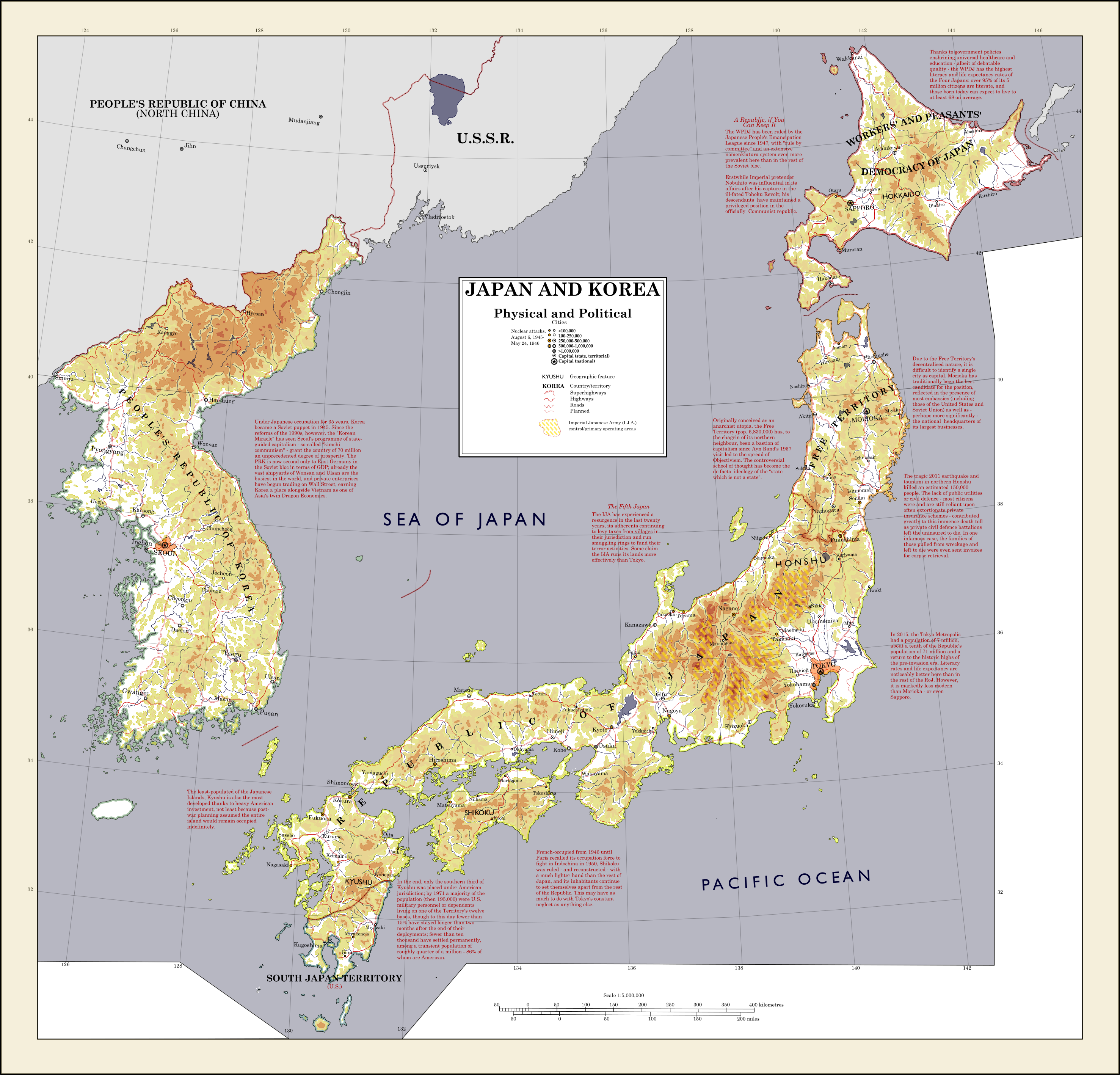Finally found time to catch up and finish this. Beautifully written, if it ended a little abruptly, in my view. Well worth the wait, and I'm eager to read whatever comes next!
Wait no longer!
Finally found time to catch up and finish this. Beautifully written, if it ended a little abruptly, in my view. Well worth the wait, and I'm eager to read whatever comes next!
Apologies @The Red,i know you're working on Our Struggle (which i also watched avidly),but re-reading this i have some few other questions.
How long does it takes for the US to pacify the Japanese holdouts?Late 40s?Mid 50s?
How's nuclear proliferation ITTL?Not only The Bomb(although many would want it more..or not) but in the power generating sense too.Is Korea,Phillipines and Vietnam has lots of reactors like Japan?
How's the relations between the Japanese-Americans and the Civil Rights Movement?Are there some who became quite radicalized,like Yuri Kochiyama IOTL for instance?
No problem! Hope you're enjoying Our Struggle.
I imagine most would be gone by the Mid 50s, though isolated individuals would probably still be around for a good while longer.
with the Cold War having never really gone away
How's the Cold War situation right now?Is it detente,with the US and USSR cooperating on several matters(Well Daesh is a thing ITTL so there's one thing they can agree upon)
The Japanese engaged in a fair bit of cannibalism OTL, so I can't imagine they'd give it up when they're in a situation where it might actually be useful.How common was cannibalism of dead American internees in Japan? Surely some crazy Japanese officer must have come up with the idea that "if the internees are useless as bargaining chips or human shields, surely they'd be more useful as food for our increasingly hungry soldiers" or something along that lines?
Sadly common, I'd bet.How common was cannibalism of dead American internees in Japan? Surely some crazy Japanese officer must have come up with the idea that "if the internees are useless as bargaining chips or human shields, surely they'd be more useful as food for our increasingly hungry soldiers" or something along that lines?
Buddist monks were forced to it... that show how the despair was.Sadly common, I'd bet.
...I really want the paperback....
Raijin
”Varuna has made a highway for the sun to go over. O thou wise spirit and king, loosen our sins!"
~ Rigveda
”Every little breeze seems to whisper Louise”
~ Dean Martin
In 1274, and 1281 Japan had stood at the mercy of a mighty foreign power preparing to cross the ocean. Though brave, the Japanese knew that the hordes of Kublai Khan bettered them in both numbers and in quality, and that if the Mongols could cross the Asian mainland to the Japanese home islands then conquest would be assured. However they would not cross, as Raijin, Japan’s protective God of Thunder sat atop the clouds and hurled lightning bolts at the incoming fleets, destroying them before they could defeat the Japanese, crippled by the ‘Divine Wind’ by which the Japanese now nicknamed their suicide aircraft, a supposed spiritual successor to Japan’s divine protectors. However it was folly to believe they could match the God of Thunder himself, in October he would remind them of their arrogance.
Typhoon Louise had first been spotted on October the 2nd as she formed around the Caroline Islands. Initially ignored, her unexpected turn north was not met with much concern as she slowed down, only to intensify, to the horror of American meteorologists, as she passed over Okinawa on October 9th. The staging area for the invasion of Kyushu, thought to have largely avoided the harsh weather seasons, was now struck with 140 mph winds. The typhoon passed and returned over the island for three days, wrecking almost every building above ground, rendering over a million troops and personnel homeless in the process. Dozens of ships awaiting the invasion were forced ashore only to be pounded into scrap by the huge waves of the storm. Dozens of planes were smashed, torn from their runways in impromptu flights, before being hurled back to Earth. By the time it was safe for medical ships to arrive, 4000 were dead, and several thousand more were seriously wounded, with bodies clinging onto wreckage still being washed onto the beaches of Buckner Bay. From the wreckage and the horror came the already clear conclusion, with dozens of ships and hundreds of aircraft destroyed or damaged, the invasion of Kyushu could not occur in November. It was estimated that it could take as long as 45 days to repair the Typhoon’s damage, delaying Olympic to just before Christmas.
In normal circumstances this would have been unacceptable, moving back Olympic ultimately meant moving back Operation Coronet, the invasion of southern Honshu, from early March to mid-April, far too close to the monsoon season, and the serious restrictions on a ground campaign that came with it. Whilst it was clear the Japanese had focused most of their efforts on the defence of Kyushu, a fight in flooded fields, with air superiority hindered from cloud cover should have been unacceptable and indeed was the reason that the Kyushu invasion had been moved ahead by a month to begin with. However these were not normal circumstances, American prestige had been badly weakened by the Soviet invasion from the invasion, and the need to land some troops, somewhere, where they could be adequately covered from the air, remained the most pressing concern. Despite even more emboldened protests by King and Nimitz, Truman indicated that they would press on. American engineers had worked miracles before, Truman was sure they could work them again. Meanwhile the Anami government, convinced that they had witnessed an actual miracle, thanked the God’s for their divine providence.
Their troops merely thanked them for the reprieve, before they continued to dig, and prepare for their enemies own, manmade, Typhoon.
